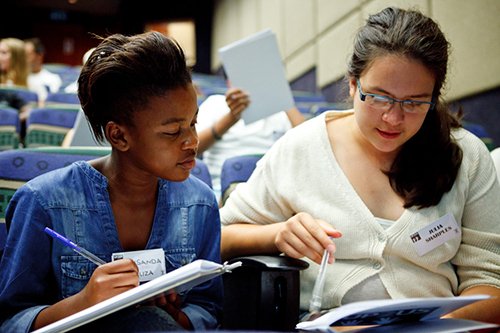
Οι κοινωνίες με ταραχώδη φυλετική παρελθόν αντιμετωπίσει τις προκλήσεις και τις ευκαιρίες όταν διαμόρφωση του μέλλοντος της χώρας τους. Όπως μάθαμε από τον Jonathan Jansen στο μου προηγούμενη Σφαιρική Αναζήτηση για το άρθρο Εκπαίδευση, εκπαίδευση μπορεί να διαδραματίσει κρίσιμο ρόλο στην επίτευξη θετικών αλλαγών. Η εξασφάλιση μαθητές είναι σε θέση να αφήσουν τις τάξεις σκέφτονται πιο συμπονετικά ένας για τον άλλον, καλλιεργώντας τις δεξιότητες που θα τους βοηθήσουν να κάνουν καλές επιλογές, και δίνοντάς τους τη δυνατότητα να ζουν ως δραστήριοι και δημοκρατικούς πολίτες σε έναν κόσμο του 21ου αιώνα, είναι όλα τα κρίσιμα γκολ.
Κατά τη διάρκεια των δέκα τελευταίων ετών, μια νοτιοαφρικανική οργανισμού εκπαίδευσης που ονομάζεται Shikaya έχει συνεργαστεί με τους καθηγητές για την επίτευξη αυτών των στόχων. Πρόγραμμα πυρήνα τους, Αντιμετωπίζοντας το παρελθόν – Μεταμορφώνοντας το Μέλλον μας αναπτύχθηκε σε συνεργασία με Αναμετρηθούμε με την ιστορία και τον Εαυτό μας και είναι τώρα στο ενδέκατο έτος του. Έχει εκπαιδεύσει εκατοντάδες καθηγητές σε εκατοντάδες σχολεία και επηρέασε τις ζωές των μαθητών σε όλη τη χώρα.
Dylan Ρέι είναι ο συν-ιδρυτής και εκτελεστικός διευθυντής της Shikaya. Έχει συντονισμό της Αντιμετωπίζοντας το παρελθόν – Μετασχηματισμός μέλλον μας έργο, δεδομένου ότι 2003. Μου ενώνει σήμερα την παγκόσμια έρευνα για την Εκπαίδευση.

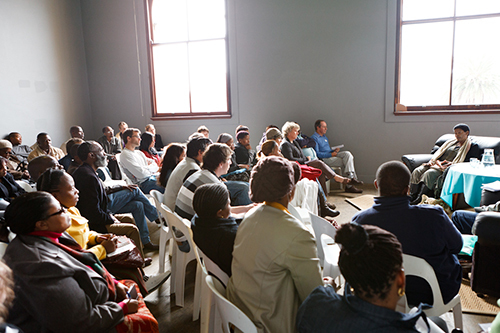
Τι βλέπετε ως το ρόλο του δασκάλου στην προετοιμασία των νέων να είναι ενεργοί πολίτες και φροντίδα?
Shikaya sees teachers as being at the very core of ensuring success in schools. The teachers decide how their students will learn in their classrooms. It is the teacher who creates the space within those walls where the students can think about their thinking and behavior, ή όχι. It is the teacher who shows his/her students through her own behavior, τι σημαίνει να είσαι συμπονετικός και την αποδοχή των άλλων, διαφορετικούς από τους ίδιους, ή όχι. It is the teacher who creates the opportunity for young people to practice democratic thinking and action. Or she doesn’t and leaves it to chance (or somebody else) that they learn and understand what it means to be an active democratic citizen.
Αυτό, φυσικά, is a big ask. Not only are we expecting improved grades from teachers, but we also expecting them to shape the values, thinking and action of the young people under their care. But I think we often forget that teachers are also people – many with different values. They also carry their own prejudices, fears and insecurities into the classroom alongside their strengths and passion. So if we are asking of teachers to be these citizen creators, we need to support them on a personal as much as a professional level.
What do you see as the role of the parent?
Parents are central in developing democratic habits. Ερευνα, για παράδειγμα, shows that if we include our children in our discussions about voting at election time and if we can actually take them with us to vote, they are more likely to vote themselves when they reach voting age. We took our three-year old sons with us to vote in our general elections just a few weeks ago. Beforehand we spoke about what we were going to do. They stood in line with us, looked over the ballot cards and watched as we made our choices. They were the ones who put the ballots in the ballot boxes for us. Just two days ago we drove past the voting station and we heard one of them say, “Κοίτα. That is where we voted.” They are learning the language and witnessing the act. By the time my boys are of voting age they will have had six more moments of voting with us. Six should be enough to develop a habit.

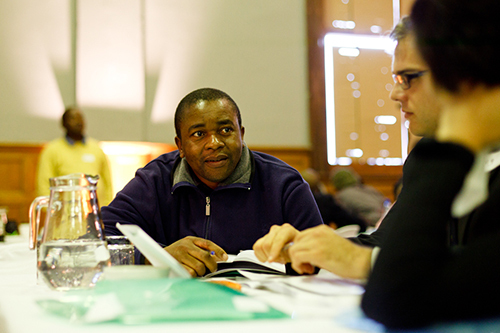
Can you speak a little about the work you are doing related to the Truth, Justice and Reconciliation Commission?
Three years ago Kenya began the Truth, Justice and Reconciliation Commission, which was formed to look into not only the post-election violence of 2007, but also the period after Independence. One particular feature of the process was that almost 9000 children testified about their experience of the post-election violence and also around issues of poverty, education and sexual violence. Brave young children all over Kenya stood before the Commissioners and told their stories.
Myself and Dr. Karen Murphy, the International Director of Facing History and Ourselves, were asked by the International Centre of Transitional Justice to create a child-friendly report of the TJRC.
We have tried to create a version of the main report that is both a resource for children and also a tool for teachers and others working with youth in Kenya. Our intention has been to capture some of the stories that children shared with the TJRC in a way that asks the reader, whether she is a teacher or a young Kenyan, to think deeply about their own choices and behavior.
We are in the final stages of writing, having recently undertaken a validation process in Kenya with various stakeholders, including children, δάσκαλοι, principals and civil society. The response was overwhelmingly positive. We have some more to do to bring in the feedback we received from the Kenyan stakeholders, and we plan to release this children’s version mid-2014.

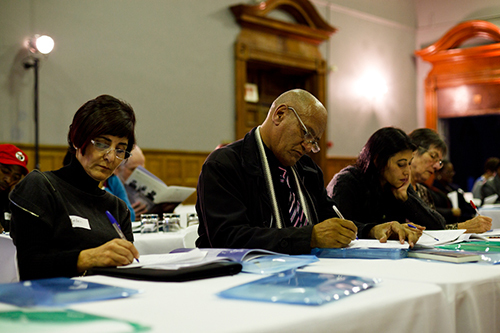
What are some of the best examples you have seen of school reform in South Africa?
One example comes from Jonathan Jansen, the Chancellor of Free State University who has already been featured in this series. He has recently published a very important book along with the filmmaker, Molly Blank. Their book, Πώς να καθορίσει Νότιας Αφρικής Σχολεία, looks at eighteen case studies of schools that are successful despite being over-crowded, in poor and remote areas, or are surrounded by schools that are failing. But these schools, for a variety of reasons ranging from the leadership of the principals to the quality and passion of the teachers, are succeeding. The book contains short videos of these schools as well as a workshop guide, which I was asked to create, that allows schools that want to learn from these stories to engage with them in their staff rooms as part of their professional development programs. The solutions and improvement strategies that emerge from these schools are relatively simple and, το πιο σημαντικό, have been shown to be successful in schools that face some very tough challenges. So if these schools can do it, then really, there is no reason why all the schools similar to these shouldn’t be able to succeed as well. We have just begun an important initiative to work closely with schools across the country using the case studies from the 18 successful schools as tools for turning other schools around.
How much focus has been given to great leadership in schools? Do you believe more needs to be done?
A few years ago, Pam Christie, the Dean of Education at the University of Cape Town, released a gem of research called Schools That Work. Her research showed that the quality of principal leadership was essential to the success of a school, and in successful under-resourced schools, when the principal left, the school’s performance immediately dropped. The depth of leadership in the schools did not generally extend beyond the principal. This was in contrast to more well-resourced schools where a change in principal didn’t necessarily see a drop in performance. Είναι, of course we need to be investing in supporting principals, but we also need to develop the school management teams as a whole if we want success to be sustainable.
Of equal importance are the district, provincial and national management structures as well. Too many people in these leadership roles have not been given the proper support and training to run very difficult and complicated systems. We often talk about the visionary principals but we also need to start talking about, finding, nurturing and developing the visionary managers of this system.

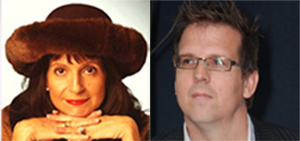
All photos are courtesy of Shikaya
For more information on Shikaya: http://shikaya.org/
Στο παγκόσμιο Αναζήτηση για Εκπαίδευση, μαζί μου και παγκοσμίως γνωστή ηγέτες σκέψης συμπεριλαμβανομένου του Sir Michael Κομμωτήριο (Ηνωμένο Βασίλειο), Ο Δρ. Michael Block (ΗΠΑ), Ο Δρ. Leon Botstein (ΗΠΑ), Καθηγητής Clay Christensen (ΗΠΑ), Ο Δρ. Linda Ντάρλινγκ-Hammond (ΗΠΑ), Ο Δρ. Madhav Chavan (Ινδία), Ο καθηγητής Michael Fullan (Καναδάς), Ο καθηγητής Howard Gardner (ΗΠΑ), Ο καθηγητής Andy Hargreaves (ΗΠΑ), Ο καθηγητής Yvonne Hellman (Η Ολλανδία), Ο καθηγητής Kristin Helstad (Νορβηγία), Jean Hendrickson (ΗΠΑ), Καθηγητής Rose Hipkins (Νέα Ζηλανδία), Καθηγητής Cornelia Hoogland (Καναδάς), Αξιότιμο Jeff Johnson (Καναδάς), Η κ. Chantal Kaufmann (Βέλγιο), Ο Δρ. Eija Kauppinen (Φινλανδία), Υφυπουργός Tapio Kosunen (Φινλανδία), Ο καθηγητής Dominique Λαφοντέν (Βέλγιο), Ο καθηγητής Hugh Lauder (Ηνωμένο Βασίλειο), Καθηγητής Ben Levin (Καναδάς), Lord Ken Macdonald (Ηνωμένο Βασίλειο), Καθηγητής Barry McGaw (Αυστραλία), Shiv Nadar (Ινδία), Καθηγητής R. Natarajan (Ινδία), Ο Δρ. PAK NG (Σιγκαπούρη), Ο Δρ. Denise Πάπα (ΗΠΑ), Sridhar Rajagopalan (Ινδία), Ο Δρ. Diane Ravitch (ΗΠΑ), Richard Wilson Riley (ΗΠΑ), Sir Ken Robinson (Ηνωμένο Βασίλειο), Καθηγητής Pasi Sahlberg (Φινλανδία), Καθηγητής Manabu Sato (Ιαπωνία), Andreas Schleicher (PISA, ΟΟΣΑ), Ο Δρ. Anthony Seldon (Ηνωμένο Βασίλειο), Ο Δρ. David Shaffer (ΗΠΑ), Ο Δρ. Kirsten Μοναδική Are (Νορβηγία), Στήβεν Spahn (ΗΠΑ), Yves Theze (Lycee Francais Η.Π.Α.), Ο καθηγητής Charles Ungerleider (Καναδάς), Ο καθηγητής Tony Wagner (ΗΠΑ), Sir David Watson (Ηνωμένο Βασίλειο), Καθηγητής Dylan Γουίλιαμ (Ηνωμένο Βασίλειο), Ο Δρ. Mark Wormald (Ηνωμένο Βασίλειο), Ο καθηγητής Theo Wubbels (Η Ολλανδία), Ο καθηγητής Michael Young (Ηνωμένο Βασίλειο), και ο καθηγητής Minxuan Zhang (Κίνα) καθώς εξερευνούν τα μεγάλα ζητήματα της εκπαίδευσης εικόνα που όλα τα έθνη αντιμετωπίζουν σήμερα.
Η Παγκόσμια αναζήτηση για την Εκπαίδευση της Κοινότητας Σελίδα
C. M. Rubin είναι ο συγγραφέας των δύο πολυδιαβασμένα online σειρά για την οποία έλαβε ένα 2011 Βραβείο Upton Sinclair, “Η Σφαιρική Αναζήτηση για Εκπαίδευση” και “Πώς θα μας Διαβάστε?” Είναι επίσης ο συγγραφέας του μπεστ σέλερ τρία βιβλία, Συμπεριλαμβανομένων Η Ρεάλ Αλίκη στη Χώρα των Θαυμάτων, Είναι ο εκδότης του CMRubinWorld, και είναι ένα Ίδρυμα Fellow δι'υπερήχων.
Ακολουθήστε C. M. Rubin στο Twitter: www.twitter.com/@cmrubinworld


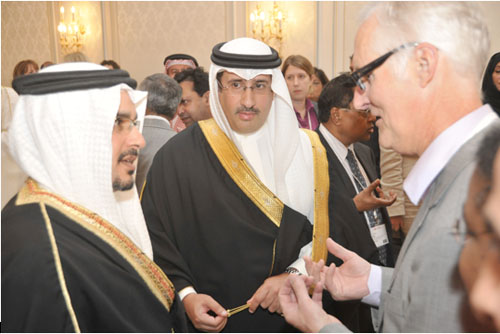
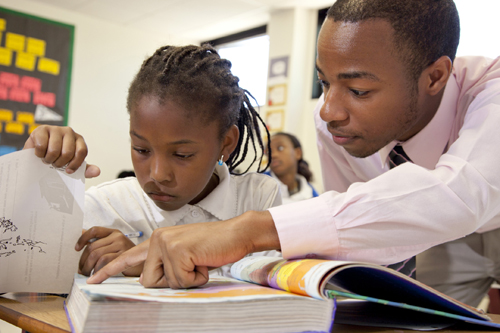
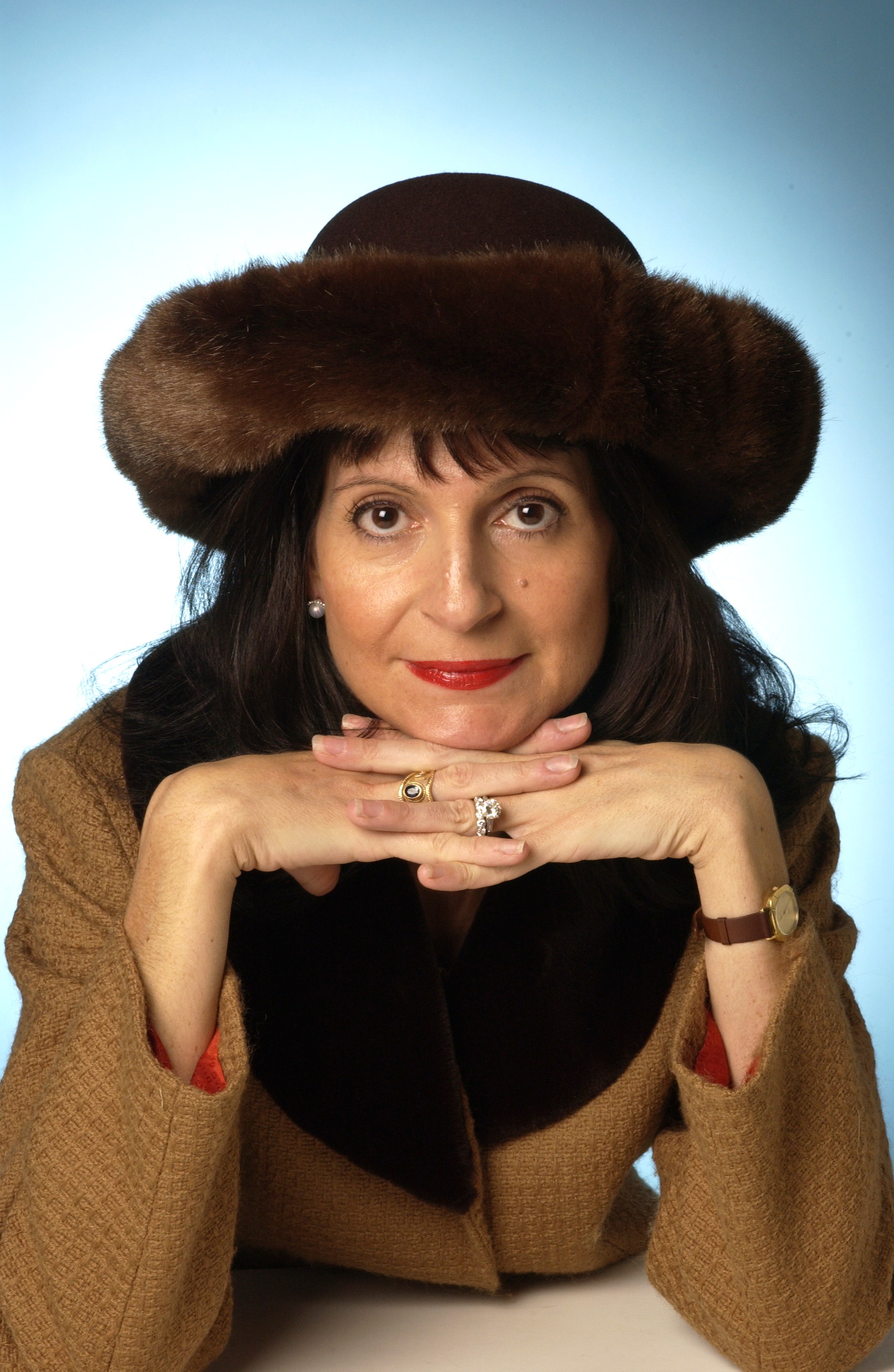
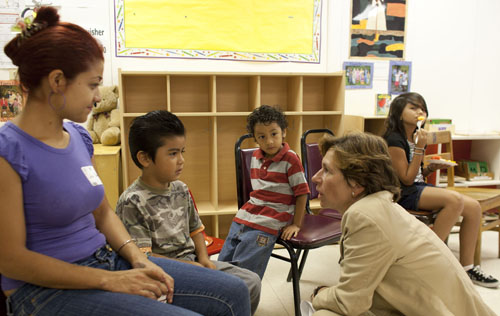
Πρόσφατα σχόλια